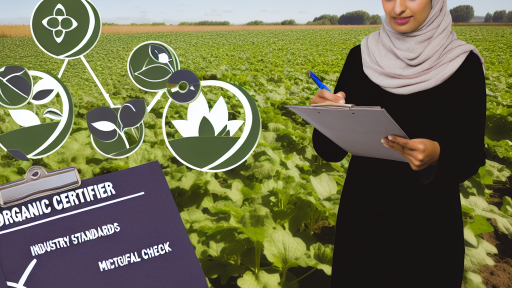Understanding the Basics of Farm Tax Regulations
Overview of Farm Taxes
Farm taxes are crucial for agricultural businesses.
They include income taxes, property taxes, and payroll taxes.
Understanding these taxes helps farmers maintain compliance.
Types of Farm Taxes
Farmers need to be aware of several tax categories.
- Income tax is applied to profits from farming activities.
- Property tax is levied on agricultural land and buildings.
- Payroll tax applies to employee wages and benefits.
Additionally, some states may impose sales tax on certain goods.
Farmers should consult local regulations for specific details.
Tax Deductions and Credits
Understanding available deductions can optimize tax liabilities.
Farmers can deduct expenses related to equipment and supplies.
They can also claim deductions for property depreciation.
Tax credits for renewable energy investments are beneficial too.
Record Keeping Practices
Accurate record-keeping is essential for farm tax compliance.
Farmers should maintain detailed financial records year-round.
This documentation supports claims for deductions and credits.
Utilizing accounting software can simplify this process.
Impact of Tax Regulations on Farming Operations
Tax regulations significantly influence farming profitability.
Transform Your Agribusiness
Unlock your farm's potential with expert advice tailored to your needs. Get actionable steps that drive real results.
Get StartedChanges in tax laws can affect financial planning strategies.
Farmers must stay informed about new tax regulations.
These updates can impact budgets and operational decisions.
The Importance of Keeping Accurate Financial Records
Overview of Financial Record Keeping
Accurate financial records are essential for farmers and agricultural businesses.
They help track income, expenses, and overall profitability.
Additionally, these records assist in budgeting and financial planning.
Facilitating Tax Preparation
Maintaining detailed financial records simplifies tax preparation.
Farmers can quickly gather needed documents and data.
This process reduces the stress associated with tax season.
Furthermore, accurate records help identify eligible deductions.
Compliance with Regulations
Farmers must comply with various tax regulations.
Accurate records ensure adherence to local and federal laws.
Compliance minimizes the risk of audits and penalties.
Regular updates and review of records are crucial.
Enhancing Business Decision Making
Financial records provide valuable insights into business performance.
Farmers can analyze trends and identify areas for improvement.
This analysis informs better business decisions moving forward.
Subsequently, more informed choices can lead to increased profitability.
Utilizing Technology for Record Keeping
Modern technology simplifies financial record keeping for farmers.
Software solutions streamline data entry and storage.
Farmers can access their financial information anytime, anywhere.
Additionally, technology often offers built-in reporting features.
Establishing a Routine
Developing a routine for updating financial records is vital.
Consistent practices ensure records are accurate and complete.
Showcase Your Farming Business
Publish your professional farming services profile on our blog for a one-time fee of $200 and reach a dedicated audience of farmers and agribusiness owners.
Publish Your ProfileDaily, weekly, or monthly check-ins help maintain organization.
Ultimately, establishing a routine promotes long-term financial health.
Types of Taxes Applicable to Farmers: An Overview
Income Taxes
Farmers must report their earnings as part of their income tax obligations.
They typically use a Schedule F to report farm income and expenses.
Indeed, understanding allowable deductions can significantly lower tax liability.
Self-Employment Tax
Farmers operate as self-employed individuals in many cases.
This means they must pay self-employment tax on their net earnings.
Calculating this correctly is vital to avoid penalties.
Property Taxes
Property taxes apply to the land and buildings used for agricultural purposes.
Farmers should stay informed about local tax rates and assessments.
Appealing an assessment can sometimes reduce property tax obligations.
Sales and Use Taxes
Certain states require farmers to pay sales tax on purchases.
However, some items may be exempt, such as certain agricultural supplies.
Knowing what qualifies for exemptions can save money.
Payroll Taxes
If farmers have employees, they must comply with payroll tax regulations.
This includes income tax withholding and Social Security contributions.
Understanding the tax responsibilities for employees is crucial.
Estate and Gift Taxes
Farmers should be aware of estate planning and the potential tax implications.
Life events such as gifting a farm can trigger gift tax obligations.
Planning ahead can help minimize these taxes for the next generation.
See Related Content: Organic Labeling Requirements For Farms
Deductions and Credits Available for Farmers
Understanding Tax Deductions
Tax deductions reduce your taxable income effectively.
Farmers often benefit from various deductions.
These deductions can significantly lower your tax liability.
Common deductions include expenses for equipment, seeds, and fertilizers.
Additionally, you can deduct property taxes paid on farmland.
Exploring Depreciation Deductions
Depreciation allows farmers to recover costs over time.
Many farmers use the Modified Accelerated Cost Recovery System (MACRS) for this.
This system allocates the cost of farm assets over their useful lives.
Equipment, buildings, and improvements can be depreciated.
Utilizing Tax Credits
Tax credits directly reduce your tax owed.
Farmers can access various credits that benefit their operations.
The Investment Tax Credit (ITC) applies to renewable energy installations.
You could also benefit from the Credit for Employer-Provided Childcare Facilities.
Specific Credits for Farmers
Several targeted credits enhance farm operations.
- The Conservation Stewardship Program rewards sustainable practices.
- The Energy Efficiency Tax Credit promotes energy-saving initiatives.
- The Small Business Health Care Tax Credit helps with insurance costs.
Documenting Your Deductions and Credits
Accurate record-keeping is vital for tax benefits.
Maintain comprehensive records of all expenses related to farming.
This documentation supports your claims during tax filings.
Utilize accounting software to streamline this process.
Always consult a tax professional to ensure compliance.
Showcase Your Farming Business
Publish your professional farming services profile on our blog for a one-time fee of $200 and reach a dedicated audience of farmers and agribusiness owners.
Publish Your ProfileMaximizing Benefits
Understanding available deductions and credits empowers farmers.
Stay informed about changes in tax regulations.
Consider annual tax planning to maximize your benefits.
Joining local farming associations can provide valuable resources.
Additionally, participating in workshops can enhance your knowledge.
Explore Further: Impact Of Certification On Farm Profitability
How to Prepare for Farm Tax Season: A Step-by-Step Guide
Gather Your Financial Documents
First, collect all necessary financial documents from the past year.
This includes income statements, receipts, and bank statements.
Ensure you have documentation for all sales and purchases.
Organize these documents in a systematic manner for easy access.
Track Your Income and Expenses
Regularly update your income and expenses throughout the year.
Utilize accounting software to simplify this process.
This will help you quickly assess your financial standing.
Additionally, categorize expenses to identify deductible items.
Understand Deductions and Credits
Research available deductions specific to agricultural operations.
Understand how equipment purchases can affect your tax liability.
Take note of credits for sustainable farming practices.
This knowledge can significantly reduce your taxes owed.
Consult with a Tax Professional
Consider hiring a tax professional with farm experience.
They can provide insight into complex tax regulations.
A professional can also help you strategize for the future.
Be proactive in scheduling consultations well before tax deadlines.
Prepare for Changes in Tax Laws
Stay informed about any changes in tax legislation affecting agriculture.
Regularly check IRS updates and state legislation changes.
Adjust your financial strategies as necessary to comply.
Awareness can prevent issues during tax filing.
Maintain Accurate Records Year-Round
Establish a habit of record-keeping throughout the year.
Regularly review and update your records to ensure accuracy.
Utilize cloud storage to secure and organize documents efficiently.
This diligence will ease the burden come tax season.
Uncover the Details: Hiring Practices Under Farm Labor Laws

Common Mistakes to Avoid When Filing Farm Taxes
Neglecting Record Keeping
Many farmers overlook the importance of meticulous record keeping.
Without accurate records, you may miss deductions.
Additionally, improper records can lead to audits.
Use accounting software to maintain clarity.
Ignoring Depreciation
Farmers often fail to claim depreciation on equipment.
This omission can significantly increase your tax liability.
Keep track of your assets for accurate depreciation tracking.
Misclassifying Income
It is critical to classify income accurately when filing taxes.
You may incur penalties for misclassified income sources.
Showcase Your Farming Business
Publish your professional farming services profile on our blog for a one-time fee of $200 and reach a dedicated audience of farmers and agribusiness owners.
Publish Your ProfileConsult a tax professional to help you categorize your income correctly.
Failing to Take Advantage of Deductions
Farm exemptions can reduce your taxable income significantly.
Many farmers are unaware of available tax deductions.
Research and identify all applicable deductions.
Always stay updated on new tax laws that affect farmers.
Overlooking Changes to Tax Regulations
Tax laws change frequently, affecting how you file taxes.
Stay informed about recent changes that impact farm taxes.
Subscribe to newsletters that focus on agricultural tax regulations.
Inadequate Preparation for Audits
Some farmers disregard the potential for audits.
Being unprepared can lead to dire consequences.
Maintain organized documentation in case of an audit.
Consider engaging a tax consultant for more complex issues.
Missing Deadlines
Missing tax filing deadlines can result in penalties.
Mark key dates on your calendar to avoid late submissions.
Consider filing early to avoid the rush.
Relying Solely on DIY Tax Software
While tax software can simplify the process, it’s not foolproof.
Complex farming situations might require professional assistance.
Evaluate your needs before deciding on DIY methods.
See Related Content: Understanding Agricultural Trade Policies
Navigating State-Specific Tax Regulations for Farmers
Understanding State Regulations
State tax regulations can vary significantly across the U.S.
Farmers must understand the specific rules in their state.
This understanding helps ensure compliance and avoid penalties.
Each state has its own agricultural tax laws and exemptions.
Review local resources for state-specific tax information.
Identifying Agricultural Tax Benefits
Many states offer tax benefits to support agricultural activities.
These benefits may include sales tax exemptions on equipment.
Additionally, some states provide property tax relief for farmland.
Farmers should investigate available programs carefully.
Consult state agricultural departments for detailed guidance.
Documenting Tax Deductions
Proper documentation is critical for claiming tax deductions.
Keep records of all farming expenses and income accurately.
This practice supports claims during audits or investigations.
Common deductible expenses include seeds, fertilizers, and labor.
Utilize accounting software to streamline this process.
Filing State Tax Returns
Filing deadlines for state tax returns vary by state.
Be aware of all relevant dates to avoid late fees.
Most states require specific forms for agricultural tax reporting.
Check with your state’s revenue department for form requirements.
Consider hiring a tax professional with agricultural expertise.
Staying Updated on Regulation Changes
Tax regulations can change regularly, impacting farmers.
Showcase Your Farming Business
Publish your professional farming services profile on our blog for a one-time fee of $200 and reach a dedicated audience of farmers and agribusiness owners.
Publish Your ProfileStay informed about new laws and amendments in your state.
Subscribe to newsletters or join local farming organizations.
These resources often provide updates on regulatory changes.
Your proactive approach will ease future tax filings.
Utilizing Professional Help
When to Hire a Tax Advisor
Navigating farm tax regulations can be complex and confusing.
Hiring a tax advisor may provide significant benefits.
Evaluate your current knowledge of tax regulations.
If you feel overwhelmed, seek professional assistance.
Consider the size of your farming operation.
Large farms often have more intricate tax situations.
Small farms may manage with simpler options.
Another factor is the diversity of your farm income.
Multiple income streams may complicate tax filing.
Professional help can streamline the process effectively.
It’s advisable to consult a tax advisor annually.
This practice helps keep you updated on changes.
Additionally, tax advisors provide strategic advice.
They can identify credits and deductions applicable to you.
Research your options thoroughly before making a choice.
Ask for recommendations from fellow farmers.
Consider checking online reviews for insights.
When you find a potential advisor, conduct interviews.
Ask them about their experience with farm taxes.
Select someone who understands your specific situation.
Ultimately, the right advisor can save you money and time.
Additional Resources
Agricultural Producer Subsidies: Navigating Challenges and Policy …
“You have to be resilient”: Producer perspectives to navigating a …




